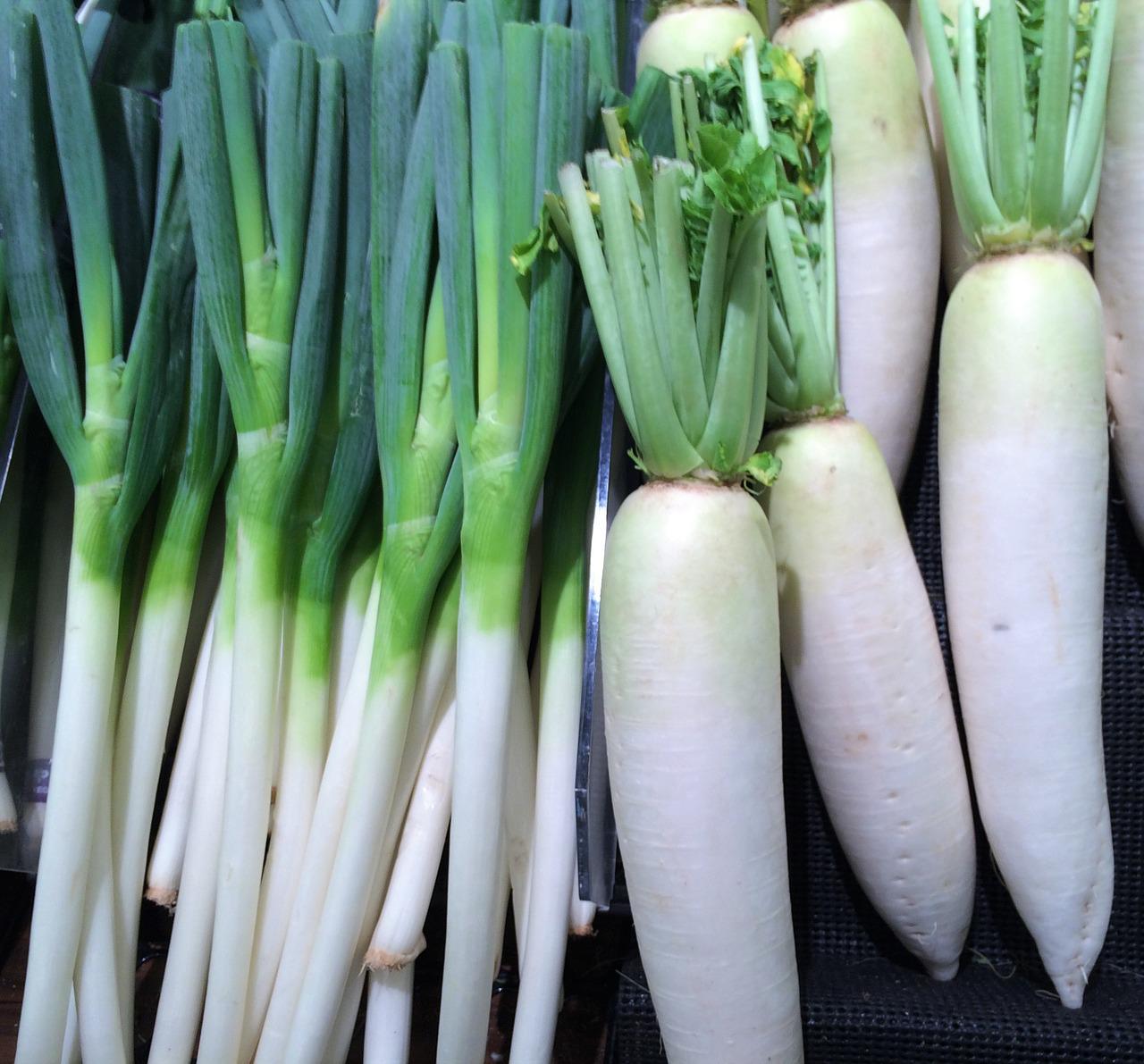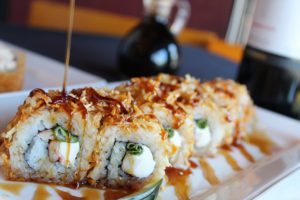食べ物 tabemono: Basic Japanese Food Vocabulary
In this post we’ll build your Japanese vocabulary by learning about everyone’s favorite language topic: Japanese food terms! Japanese food vocabulary will come in handy no matter why you’re learning Japanese, so let’s dig in.
おなかがすきました! Onaka ga sukimashita! I’m hungry!
Let’s start to build your Japanese vocabulary by learning some expressions that you’ll probably need to know that are related to Japanese food vocabulary.
- おなかがすきました。
Onaka ga sukimashita.
I’m hungry. - 喉が渇きました。
Nodo ga kawakimashita.
I’m thirsty.
- 何か食べたいです。
Nani ka tabetai desu.
I want something to eat. - 何か飲みたいです。
Nani ka nomitai desu.
I want something to drink. - おやつが食べたいです。
Oyatsu ga tabetai desu.
I feel like a snack.
夕飯ができました! Yuuhan ga dekimashita! Dinner is ready!
You probably want to know how to talk about meals when you’re using Japanese food terms. The meals in Japanese are: 朝ご飯 asagohan (breakfast), 昼ご飯 hirugohan (lunch), and 夕飯 yuuhan (dinner). A snack is おやつ oyatsu. Dessert is デザート dezaato.
- 今日の朝ご飯は何ですか。
Kyou no asagohan wa nan desu ka.
What’s for breakfast? - 今日の昼ご飯は何ですか。
Kyou no hirugohan wa nan desu ka.
What’s for lunch? - 今日の夕飯は何ですか。
Kyou no yuuhan wa nan desu ka.
What’s for dinner? - デザートは何ですか。
Dezaato wa nan desu ka.
What’s for dessert? - 私は朝早く朝ご飯を食べます。
Watashi wa asa hayaku asagohan o tabemasu.
I eat breakfast early. - 同僚と昼ご飯を食べます。
Douryou to hirugohan o tabemasu.
I eat lunch with colleagues. - 家族と夕飯を食べます。
Kazoku to yuuhan o tabemasu.
I eat dinner with my family.
何を食べていますか。 Nani o tabete imasu ka. What are you eating?
Now let’s see some basic Japanese vocabulary related to foods and beverages. We’ll divide these Japanese food terms into sections.
Japanese Food Vocabulary: Carbs and Protein
- パン pan bread
- 米 kome rice (uncooked)
- ご飯 gohan rice (cooked)
- パスタ pasuta pasta
- 麺 men noodles
- 肉 niku meat
- 鶏肉 toriniku chicken
- 牛肉 gyuuniku beef
- 豚肉 butaniku pork
- ハム hamu ham
- ラム肉 ramuniku lamb
- 豆腐 toufu tofu
- 魚 sakana fish
- 海老 ebi shrimp
- 蟹 kani crab
- 鰻 unagi eel
- アサリ asari clam
- ロブスター robusutaa lobster
- いか ika squid
- たこ tako octopus
- うに uni sea urchin
More Japanese Food Vocabulary: Vegetables, Fruit, Dairy
- 野菜 yasai vegetables
- トマト tomato tomato
- 玉ねぎ tamanegi onion
- にんにく、ガーリック nin’niku, gaarikku garlic
- レタス retasu lettuce
- ほうれん草 hourensou spinach
- アスパラガス asuparagasu asparagus
- キャベツ kyabetsu cabbage
- きのこ kinoko mushroom
- きゅうり kyuuri cucumber
- ピーマン piiman pepper (bell)
- 唐辛子 tougarashi chili pepper
- 果物 kudamono fruit
- りんご ringo apple
- 梨 nashi pear (Asian)
- 洋梨 younashi pear (Western)
- 桃 momo peach
- オレンジ orenji orange
- レモン remon lemon
- ぶどう budou grape
- いちご ichigo strawberry
- バナナ banana banana
- ナッツ nattsu nut
- ピーナツ piinatsu peanut
- 種 tane seed
- 小麦 komugi wheat
- シリアル shiriaru cereal
- 塩 shio salt
- 胡椒 koshou pepper
- 胡麻 goma sesame
- 蜂蜜 hachimitsu honey
- 砂糖 satou sugar
- 醤油 shouyu soy sauce
- 卵 tamago egg
- 牛乳、ミルク gyuunyuu, miruku milk
- チーズ chiizu cheese
- バター bataa butter
Japanese Food Terms for Drinks, Sweets, and More
- 水 mizu water
- お茶 ocha tea
- 紅茶 koucha black tea
- 緑茶 ryokucha green tea
- コーヒー koohii coffee
- ワイン wain wine
- ビール biiru beer
- 豆乳 tounyuu soy milk
- アイスクリーム aisukuriimu ice cream
- ケーキ keeki cake
- パイ pai pie
- クッキー kukkii cookie
- キャンディー kyandii candy
- 食べる taberu to eat
- 飲む nomu to drink
- 料理する ryourisuru to cook
- ご飯をたくさん食べます。
Gohan o takusan tabemasu.
I eat a lot of rice. - 朝、コーヒーと紅茶のどちらを飲みますか。
Asa, kōhī to kōcha no dochira o nomimasu ka.
Do you drink tea or coffee in the morning? - 料理がとても上手ですね!
Ryōri ga totemo jōzu desu ne!
You cook very well!
ナプキンをいただけますか。 Napukin o itadakemasu ka. Could I have a napkin, please?
Now that you know some basic Japanese food vocabulary, let’s see some phrases that will come in handy when you’re ordering food. Some vocabulary related to Japanese food terms is: お皿 osara plate, お椀 owan Japanese style bowl, ボウル bōru Western style bowl, ナイフ naifu knife, スプーン supūn spoon, フォーク fōku fork, 箸 hashi chopsticks, カップ kappu cup, グラス gurasu glass, ナプキン napukin napkin.
- {ナプキン/フォーク/ナイフ/スプーン/お箸}をいただけますか。
{Napukin/Fooku/Naifu/Supuun/Ohashi} o itadakemasu ka.
Could I have a napkin/fork/knife/spoon/chopsticks? - お水を一杯いただけますか。
Omizu o ippai itadakemasu ka.
Could I have a glass of water? - フォークとナイフとスプーンはどこですか。
fōku to naifu to supūn wa doko desu ka.
Where are the forks, knives, and spoons? - フォークとナイフとスプーンは引き出しの中です。
fōku to naifu to supūn wa hikidashi no naka desu.
The forks, knives, and spoons are in the drawer. - きれいなグラスはキャビネットの中です。
Kirēna gurasu wa kyabinetto no naka desu.
The clean glasses are in the cabinet. - コーヒーカップは棚の上です。
Kōhī kappu wa tana no ue desu.
The coffee cups are on the shelf. - 木の箸と金属の箸とどちらを使いますか。
Ki no hashi to kinzoku no hashi to dochira o tsukaimasu ka.
Do you use wooden or metal chopsticks? - ナプキンをいただけますか。
Napukin o itadakemasu ka.
Could I have a napkin, please?
お味はいかがですか。 Oaji wa ikaga desu ka. How’s your food?
Let’s close with some Japanese vocabulary that you can use to talk about your food: 美味しい oishii delicious, 塩辛い shiokarai salty, 甘い amai sweet, 苦い nigai bitter, 酸っぱい suppai sour.
- 美味しいです。
Oishii desu.
It’s delicious. - 熱すぎます。
Atsusugimasu
It’s too hot. - 冷たすぎます。
Tsumetasugimasu.
It’s too cold. - 甘すぎます。
Amasugimasu.
It’s too sweet. - しょっぱいです。
Shoppai desu.
It’s too salty. - 味がしません。
Aji ga shimasen.
It’s tasteless/bland. - 焼き過ぎです。
Yakisugi desu.
It’s overcooked. - 生焼けです。
Namayake desu.
It’s undercooked. - あぶらっこいです。
Aburakkoi desu.
It’s oily/greasy.
Learn Japanese with the Language Garage
We hope you’ve enjoyed growing your Japanese vocabulary with some Japanese food terms. If you’d like to learn more, check out our other posts on Japanese language, culture, and more. And if you’re looking for convenient and affordable live Japanese lessons with a real teacher, check out the Language Garage. Our lessons are given online in a virtual classroom, so it doesn’t matter where you live or work – we can come to you. And we have flexible options, with a free trial so that you can decide if there’s a fit. Check us out!






